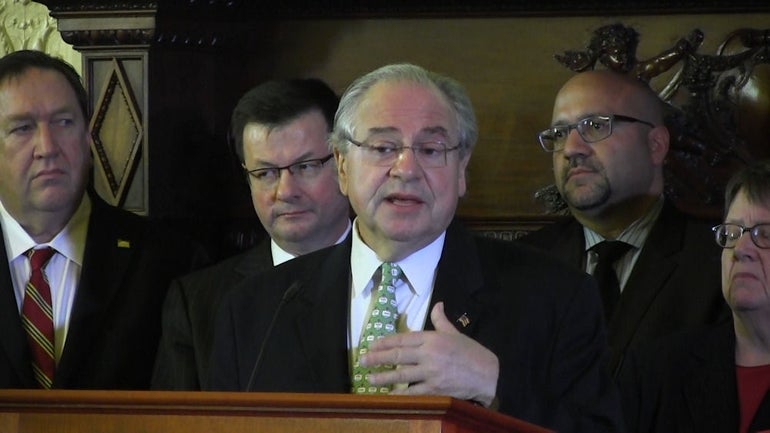The Legislature may restore some, but not all, of the $98 million in spending Gov. Charlie Baker cut from the budget in December, but House Speaker Robert DeLeo said Wednesday he wants at least one more month’s revenue report before taking any action.
“I think it’s still very much up in the air. I think that the good part was that we’ve pretty much been stable,” DeLeo told the News Service when asked if the December and January revenue reports were sufficient for the House to start drafting a supplemental budget to restore the cuts. “Right now as we speak I would have to say I’m not sure if we’re there. I don’t think we’re there yet.”
In early December, Baker cut $98 million from the $39.25 billion state budget in an effort to match sluggish state revenues with likely spending, including accounts he said the Legislature underfunded.
Legislative leaders said the cuts were premature and pledged to restore funding as revenue collections allow.
At the time, DeLeo tweeted, “Depending on Dec #s, we’re considering a supp budget. I’m particularly focused on programs that help the neediest among us.” And Senate President Stanley Rosenberg added, “I look forward to working with @SpeakerDeLeo on restoring funds to programs which support our neediest.”
January revenues of $2.703 billion were roughly on target with benchmarks, and collections and fiscal year-to-date revenue are 0.2 percent, or $33 million, shy of benchmark, a small margin in a nearly $40 billion budget. January receipts were up 4.4 percent, or $114 million, over January 2016. Tax collections are up 2.7 percent over the first seven months of fiscal 2017, the Department of Revenue reported earlier this month.
The revenue picture was bright enough for the Legislature last week to pass an $18 million pay raise package for public officials over Baker’s objections. Baker called the bill “fiscally irresponsible” but legislators said they deserved significant raises, along with judges and constitutional officers.
DeLeo said he is watching revenue numbers “very closely” and that he receives letters almost daily from groups detailing how Baker’s 9C cuts “damaged” their ability to provide services to Massachusetts residents.
“So it is my desire to do something. It is doubtful we could restore everything in full but at the very least I’d like to see us at least make partial restoration,” DeLeo said.
Baker’s cuts hit funding for health care, the State Police, municipal regionalization, parks and recreation, senior care and eliminated funding for a postpartum depression pilot program, a Down Syndrome clinic and a suicide prevention account. The largest cuts came from MassHealth fee-for-service payments and the Massachusetts Office of Travel and Tourism budget, while the smallest cut of $10,000 was for elder home care purchased services.
In total, 140 programs and accounts in the budget were reduced, including the elimination of a $2 million “Big Data and Innovation Workforce” fund, money for digital health internships, and a computer science education initiative.
After Baker announced his cuts in December, Senate budget chief Karen Spilka said, “The governor is shifting important funding away from the priorities of the Legislature in favor of his own. These cuts will have real consequences on all the communities of the Commonwealth struggling with opioid addiction and housing and should not be made at this time.”
DeLeo said he wants to see at least the February revenue report, which will come out in early March, before moving ahead with plans to restore spending.
One state budget analyst said it was too soon to know if the state can afford to restore the $98 million cut by Baker, and suggested DeLeo and Senate President Stanley Rosenberg wait until seeing the April revenue report before taking any action.
“I think it’s probably premature to do anything to undo the solutions at this point,” said Doug Howgate, director of policy and research at the Massachusetts Taxpayers Foundation.
Being 0.2 percent below benchmark for the year, Howgate said, is “not horrible” but revenues are “not doing a whole lot better” or worse than expected.
“At this point I don’t think any of the underlying assumptions about the gap closing have really materially changed, and so the next kind of sign post on that would be not until you get April revenues,” he said. “Maybe those are much better than anticipated and at that point maybe then it’s time to reevaluate some of those things.”

